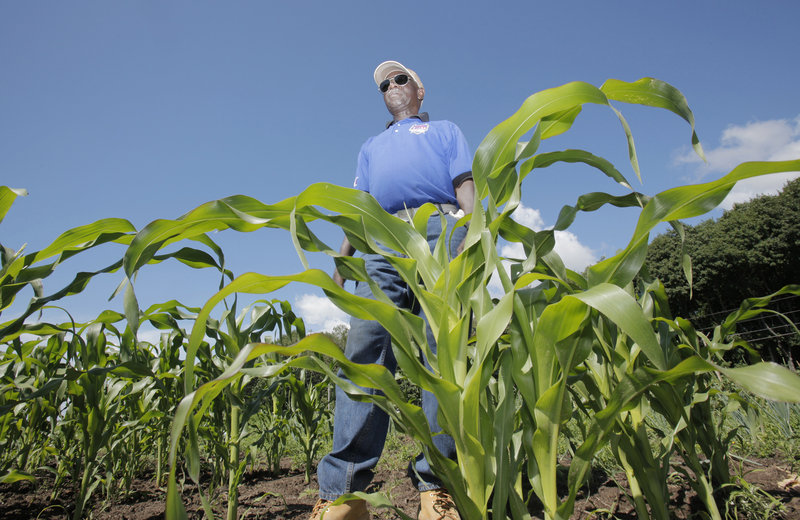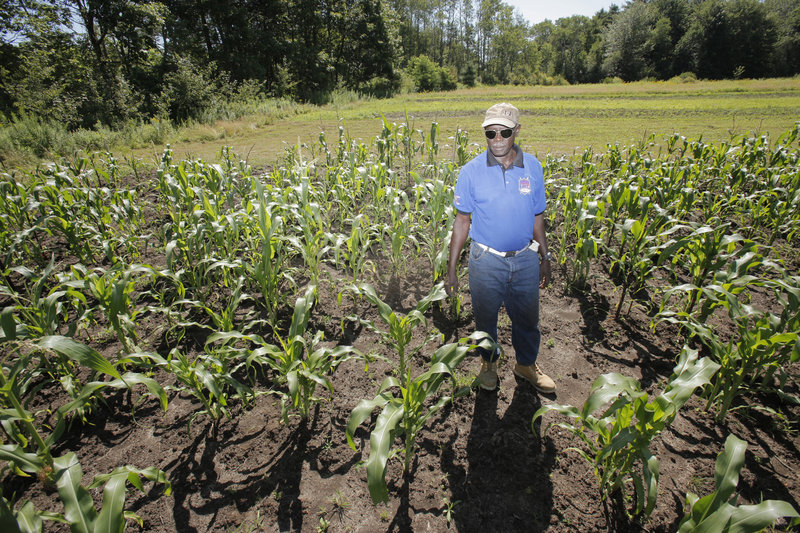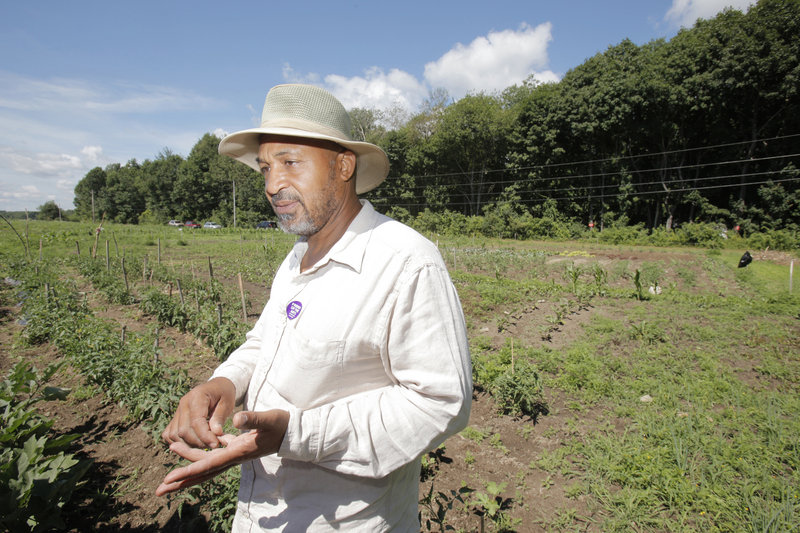FALMOUTH — Boulis Kodi treads lightly through a thriving garden patch, showing off a summer’s worth of hard work by Nuba Mountain refugees from Sudan.
“This is the sweet corn, and this is the tomatoes over here,” said Kodi, who is the farm manager for the Center for African Heritage garden project at Tidewater Farm, just down the road from the University of Maine Regional Learning Center.
He points to some greens that look as if they could be thrown right into a salad.
“This one that you see here, it’s an African (herb) just like spinach, but we use it for the soup,” Kodi said. “The taste is very good, and it’s (high in iron.)”
These plots, on nearly three acres, are being leased from the Tidewater Conservation Foundation by nonprofit groups representing African immigrants and refugees so families can grow their own food and become more self-sufficient.
The project also is growing food for the Portland public schools in gardens that are filled with tomatoes, cucumbers, Swiss chard and zucchini. Another garden will provide produce for food banks.
“Part of what we’re trying to do is really address food security and good, healthy food,” said Dawud Ummah, president of the Center for African Heritage. “You can secure the food by buying a bunch of junk, or you can secure the food by producing good healthy food, and that’s how we would like to engage in it.”
The Tidewater gardens are an experiment of sorts. Ummah and Kodi are watching closely to see which groups are truly committed to producing successful gardens. The idea is that eventually the plots will move to a larger site somewhere else in southern Maine, where they could be expanded and feed more people.
But before the project reaches that level, Ummah and Kodi want to make sure the farmers are serious. They watch to see how often the gardens are tended, and they notice when there are more weeds than there should be.
“This spot is really a test for those who are committed in the future to where we’re heading, to something huge,” Kodi said.
Kodi points to a scruffy-looking, obviously neglected plot full of weeds. The group that was supposed to farm this plot has not come through, and the opportunity has been wasted.
“They said they were going to occupy this space, but unfortunately they didn’t show up,” Kodi said.
Next to that plot is a beautiful garden planted and tended by the Somali Bantu. This group comes at least twice a week to tend its tomatoes, spinach and other produce.
“Our goal is to grow food for our own families, to make sure we do not depend on food stamps any more,” said Muhidin Libah of Lewiston.
If this project works out, Somali Bantu would like to lease a larger piece of land in the Lewiston area for farming.
Libah said he and Mohamed Farah, as organizers of their group’s garden, have had to convince some families that putting their time and effort into the project will be worth it.
“Back home in Somalia, we had a little bit of problem because when we harvest our crops, the value of everything goes down,” Libah said. “When it’s time for planting, the value of crops go up. We had difficult time just putting food on the table. People who are not educated think that here it’s the same way.”
The Somali Bantu group has designated a small part of their garden for feeding Haitian orphans. The produce they grow will be sold and the money given to the Sacred Heart Church/St. Dominic Parish on Mellen Street for its Haiti Project.
Libah said growing food at Tidewater Farm has given Somali Bantu families a way to teach young people in their community about their farming heritage. Students are brought to the farm on school holidays to work and learn about the program.
“By this time, a child 15 years old (living in Somalia) should have his own piece of land for farming,” Libah said. “But now here, 15 years old, he’s in school and not doing anything. So we are trying to show them what we have to do, and how hard or easy it is to grow food for the family.”
The Tidewater gardens have also given some teenagers an opportunity to earn summer cash.
Ummah said the Center for African Heritage used a grant from United Way this year to hire three young people to work in the plots for $5 an hour, five hours a day.
“We try to get across to kids, if you’re out here farming, this is a profession, man,” Ummah said. “Don’t take this light-weight. There’s things that you need to know. There’s safety involved, cleanliness involved.
“We make sure they get out here and cut the grass and keep it low because we do have snakes out here, you know. And if you keep it low, it keeps the bugs down, and if you keep the bugs down, you get to keep your crop.”
Kaylee Taylor and Ibrahim Mohamed, both 17, typically arrive at 5 a.m. and try to get their weeding and other chores done before the midday sun gets too hot.
“It’s been a learning experience,” Taylor said. “At first, I was just looking for a summer job, and then I learned about this. We basically just come out here and take care of the crops and the land and stuff it can be (hard work), but it’s rewarding.”
Ummah points out that farming can be healing, both physically and emotionally, for refugees whose pasts are riddled with trauma.
“This serves as therapy, to get your head together to have some kind of plan to get ready to get off (public assistance),” he said. “You can’t just pop off of public assistance depressed.”
Ummah, a Gulf War veteran who has suffered post-traumatic stress, says he was healed himself by farm work.
An injured hand gained more flexibility and range of motion after he started milking goats.
“I got stronger shoveling manure,” he said. “It works. I was stronger; I got off medications.”
Kodi, the farm manager, is a Nuba Mountain refugee from Sudan who was tortured and hung upside down in a tree before fleeing to Egypt, Libya and several other countries, finally ending up in the United States.
He just returned to the States four months ago after serving as a linguist in Iraq for the U.S. Army.
Support for the Tidewater Farm project has come from all corners, including the town of Falmouth and Skillins Greenhouses, which regularly donates money and products such as fertilizer. Inmates at the Maine State Prison recently donated $1,000 to the NAACP, which also sponsors a garden plot. About half of that money is paying for families who otherwise couldn’t afford to participate.
And, of course, the farmers regularly consult with the University of Maine agricultural experts just down the road.
Ummah’s long-term vision for the project is huge.
“You have Somalis who are professional goat herders,” he said. “In the Sudanese community, professional cattlemen. These people know the cows. There’s other people that grow sheep. There’s a food industry sitting right here, ready to go to work.
“It’s not just raising vegetables.”
Staff Writer Meredith Goad can be contacted at 791-6332 or at: mgoad@pressherald.com
Send questions/comments to the editors.





